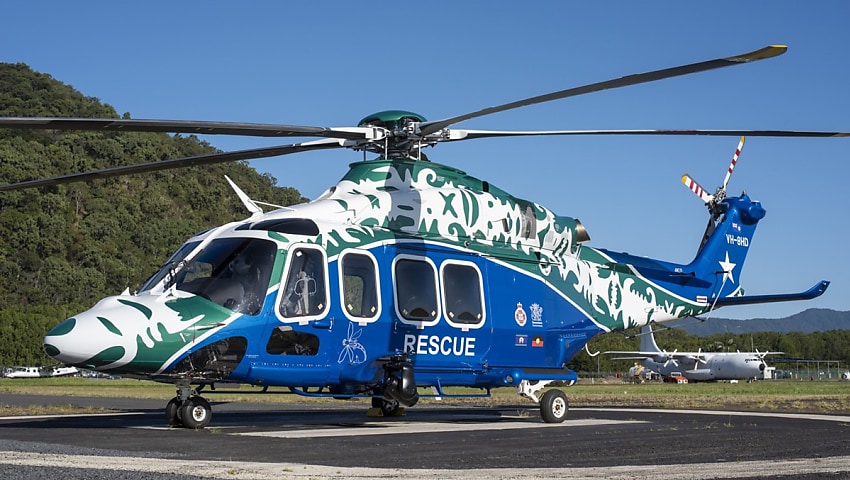Two new critical incident helicopters that will conduct life-saving aeromedical evacuations will be operational across the Torres Strait within a matter of months, after successfully arriving in Queensland.
Babcock Australasia officially handed over the Leonardo AW139 helicopters to Queensland Health in Cairns, where they are being fitted with specialist medical equipment before heading to the Torres Strait.
The new aircraft can fly faster and further than the existing fleet and have enhanced retrieval, search, and rescue capabilities, assisting crews to respond quicker to those needing emergency assistance.
“Babcock has served the Torres Strait community for more than 27 years, so we understand the often unpredictable and unforgiving conditions residents face in an emergency. And how important it is to have a high-performing emergency helicopter service providing fast and quality healthcare,” Babcock Australasia chief executive officer Andrew Cridland said.
“These two state-of-the-art custom helicopters will allow our crews, and Queensland Health’s highly skilled medical staff, to safely undertake high-stakes rescue operations in this remote part of Australia.
“Our purpose at Babcock is to create a safe and secure world together and these upgraded services will further improve equitable access to healthcare for the people of the Torres Strait.”
Benefits for the Torres Strait community include enhanced night search activity through the inclusion of electro-optic and infrared systems, a significantly greater flight range (up to 1,100 kilometres or five hours flying time) allowing for extended search times and a reduction in refuelling stops to reach outer islands in bad weather, increased patient, providing crew and paramedic comfort through a climate control system, smoother patient transfers delivered by a power loader stretcher system, increased weight capacity, allowing for the installation of more specialist equipment and additional fuel load.
“As the Ministerial Champion for the Torres Strait, I am acutely aware of the challenges of providing health care in this beautiful and extremely remote part of Queensland. These brand-new helicopters will support our hardworking health heroes to safely transfer patients and deliver emergency health care in some of the most remote locations in the state,” Queensland Minister for Health, Mental Health and Ambulance Services Shannon Fentiman said.
Colourful livery, designed by renowned indigenous artist Alick Tipoti, makes the helicopters instantly recognisable and includes a distinctive dragonfly motif painted on the underside of both aircraft.
The dragonfly is known in the Torres Strait as “Kuyup”, a term also used by islander peoples to describe a helicopter. Together, the two aircraft will form the Lagaw (Island) Kuyup (Helicopter) Rescue Service.
Tipoti’s artwork – commissioned by Queensland Health and sponsored by Babcock, Leonardo Helicopters and LCI – aims to illustrate the positive impact helicopter services have in supporting the Torres Strait community.
“‘Kuyupaw Yabu’ translates to the flight path of the dragonfly, in this case our very own rescue helicopter,” Tipoti said.
“The services and technology it offers are a great blessing and benefit to our people in the Torres Strait region.”
The aircraft, which will take up residency at Babcock’s Horn Island Base by the end of the year, will replace two existing B412 helicopters currently servicing the Torres Strait.
To support the delivery of the new aircraft, Babcock has committed to upgrading its hangar facilities on Horn Island. Discussions are currently underway with the Torres Shire Council and airport operators to progress those plans.
Upgrades are also being undertaken at some landing sites across the islands to accommodate the wheeled undercarriage of the new aircraft.
As part of its ongoing commitment to the Torres Strait community, Babcock is also offering an indigenous apprenticeship in either avionics or mechanical aeroskills. This four-year apprenticeship will lead to a Licenced Aircraft Maintenance Engineer (LAME) accreditation for the successful applicant. In addition, a qualified sheet metal worker has been hired for the base. Applications for the apprenticeship are now open.
Babcock has provided 24/7 Helicopter Emergency Medical Services on behalf of Queensland Health since 2007, and last year, safely transported close to 450 patients in need of medical assistance.
Aerial services form a critical part of medical operations across the Torres Strait due to the restricted movement of vehicles across the hundreds of islands within the archipelago. Aeromedical services are often the only way to transport sick patients to hospital.



